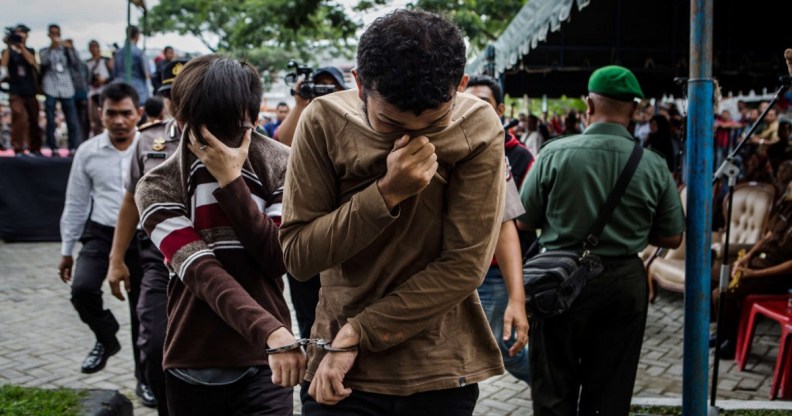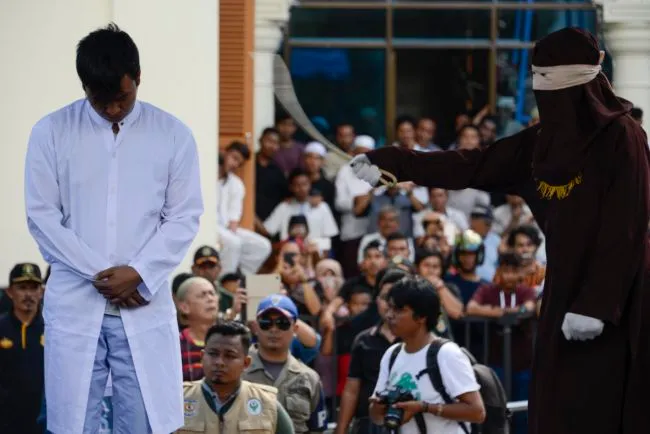An Indonesian city has banned gay sex to ‘eradicate LGBT’

Gay sex is banned in the Indonesian province of Aceh and South Sumatra. (Ulet Ifansasti/Getty)
Pariaman in Indonesia has passed a law banning gay sex and other “acts that are considered LGBT.”
The city on Sumatra island, which is home to more than 80,000 people, will issue one million rupiah (£55) fines to same-sex couples convicted of committing “immoral acts” and anyone who is found to be “acting as a transvestite,” according to AFP.
Fitri Nora, head of the local legislature, explained the legislation, which was passed on Tuesday (November 27), means that “same-sex LGBT and transgender people will be subject to sanctions and fines if they disturb the public order.”
Pariaman’s gay sex ban meant to get rid of queer people
The city’s deputy mayor, Mardison Mahyudin, told Reuters that the law was part of a campaign to “eradicate LGBT.”
He added: “According to our customs, the Minang customs, we are against such acts and behaviour.”
The deputy mayor blamed “anxiety” over queer people in the country for the new legislation in Pariaman, a name which translates as “safe area.”
The Governor of West Sumatra, Irwan Prayitno, gave a similar explanation for the law, explaining that it was part of finding a solution to what he called the “LGBT problem.”
Prayitno said that “at a minimum, we’re trying to prevent the population from increasing.”
Law banning gay sex and ‘LGBT acts’ condemned
Andreas Harsono, Human Rights Watch’s Indonesia researcher, told PinkNews that the new legislation was “unconstitutional” but would be enforced.
Harsono said that the move marked Indonesia’s “first law which discriminates against LGBT people” outside of the Aceh province, which has Sharia law and bans gay sex on penalty of receiving lashes.

People are already punished for having gay sex in Aceh (CHAIDEER MAHYUDDIN/AFP/Getty)
Earlier this month, the region of East Kotawaringin drafted an anti-LGBT law because—according to its leader Supian Hadi—homosexuality is an “infectious disease,” but has not yet passed the legislation.
Harsono revealed that “the local parliament in Pariaman based this particular bylaw on Islamic Sharia law. They referred to the Quran to justify writing this law.”
When asked whether the legislation would be put into practice by local authorities in Pariaman city, he said: “Yes, of course it will be enforced.
“We have heard cases of LGBT people being arrested almost every day in Indonesia, with police mostly citing public order regulations.”
LGBT people in the country were “very scared,” said Harsono, adding that many have escaped their hometowns for the capital, Jakarta, despite multiple mass arrests of LGBT people having taken place there in recent times.
A total of 141 men were arrested last year for attending what authorities called a “gay sex party,” leading to 10 of the men being convicted and handed prison time.
But LGBT people continue to seek asylum in Jakarta, with Harsono saying that “one organisation told me 4,500 trans women have arrived in Jakarta over the last three years.
“They are jobless, having lost their businesses back home, and many become sex workers in Jakarta, which is risky.
“HIV prevalence is also rising all over Indonesia, because many who spoke out for medication and counselling are disappearing,” he added.
“This is a big problem, and it’s like going into a bottomless well, because how can you undo the Sharia law?”

